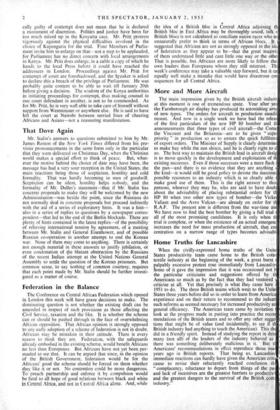Federation in the Balance
The Conference on Central African Federation which opened in London this week will have grave decisions to make. The dominating question is not whether the existing draft can be amended in respect of such provisions as those affecting the Civil Service, taxation and the like. It is whether the scheme can or should be pushed, through in the face of overwhelming African opposition. That African opinion is strongly opposed to any early adoption of a scheme of federation is not in doubt. Africans may be mistaken in their attitude. There is every reason to think they are. Federation, with the safeguards already embodied in the existing scheme, would benefit Africans no less than Europeans. But Africans have not yet been per- suaded to see that. It can be argued that since, in the opinion of the British Government, federation would be for the Africans' good the scheme should be forced on them whether they like it or not. No contention could be more dangerous. To preach partnership and enforce it by compulsion would be fatal to all hope of good relations between black and white in Central Africa, and not in Central Afria alone. And, while the idea of a British bloc in Central Africa adjoining British bloc in East Africa may be thoroughly sound, talk British blocs'is not calculated to conciliate native races who n unnaturally prefer to think in terms of African blocs. It suggested that Africans are not as strongly opposed to the ide of federation as they appear to be—that the great majori of them understand little and care little one way or the othe That is possible, but Africans are -more likely to follow the own leaders than Europeans whom ,they still mistrust. Th week's conference may take a valuable, step forward, but it ca equally well make a mistake that would have disastrous co sequences for all Central Africa.






























 Previous page
Previous page